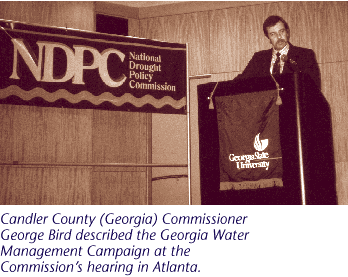|
|
part of this problem can be attributed to the fact that the Department must wait for congressional emergency appropriations before assistance can be provided. Then the appropriation must be prorated among applicants. We heard that such assistance is often "too little, too late." We note that the Stafford Act and its implementation by the Federal Emergency Management Agency is an effective, proven model for organizing and providing emergency assistance during most catastrophic natural disasters. One reason for this success is that the Agency can draw on an annual appropriated fund to pay for disaster assistance. The Stafford Act authorizes only measures to protect health and safety, however, and has rarely been used to respond to drought-caused emergencies. Need to Coordinate Drought-related Programs. The need for coordination among federal drought-related programs was a strong and recurring theme in much of the testimony at our hearings and in written comments submitted independently to the Commission. Every analysis of past responses to major droughts notes that these programs need to be better coordinated and integrated. The report prepared for the Commission by the Western Drought Coordination Council strongly suggested establishing a federal drought coordinating body. Service delivery networks do exist for many federal drought-related programs. However, we heard that they are not well integrated, and the people who need information about the programs are not always well served. There is no central point of contact concerning all federal programs and even within the same federal department, we were told, there may be many drought-related programs but no one contact to help people access programs, information, and products. Recommendations Our findings led us to conclude first that the United States should embrace a national drought policy with preparedness at its core. Federal resources should be dedicated to assisting nonfederal interests and the public at-large to prepare for drought. We therefore recommend that Congress pass a National Drought Preparedness Act, which would establish a nonfederal/federal partnership through a National Drought Council as described in Recommendation 5.1. The primary function of the Council would be to ensure that the goals of national drought policy are achieved. The five goals and accompanying recommendations are summarized below. None of our recommendations should be construed as diminishing the rights of states to control water through state law, as specifically directed by the National Drought Policy Act, nor (continue) |
|
|
 |
|
|
